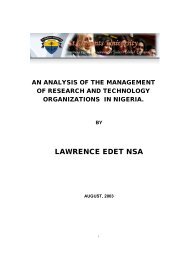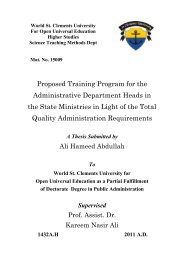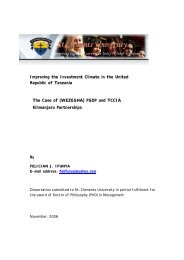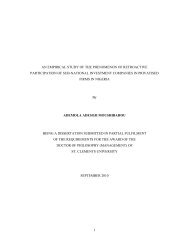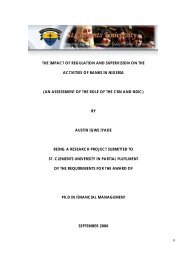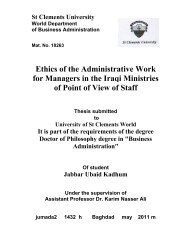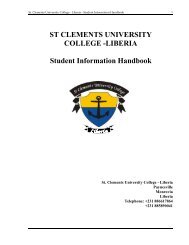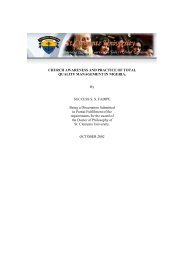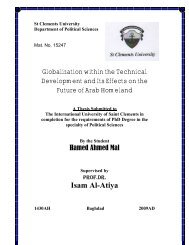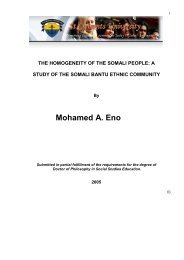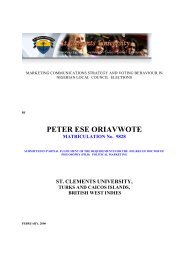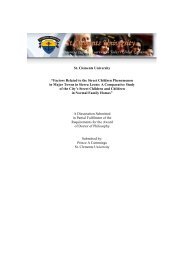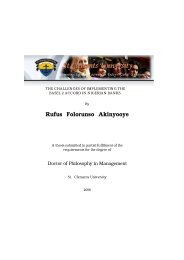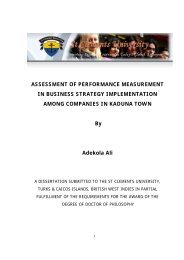The role of informal microfinance institutions in saving
The role of informal microfinance institutions in saving
The role of informal microfinance institutions in saving
You also want an ePaper? Increase the reach of your titles
YUMPU automatically turns print PDFs into web optimized ePapers that Google loves.
• Review, amend or enact registrations, <strong>in</strong>clud<strong>in</strong>g adm<strong>in</strong>istrative procedures and<br />
requirements <strong>in</strong> order to enhance the growth and susta<strong>in</strong>ability <strong>of</strong> cooperatives and the<br />
apex cooperative organizations <strong>in</strong> a rapidly chang<strong>in</strong>g socio-economic environment;<br />
broaden and deepen the outreach <strong>of</strong> cooperatives among the poor, particularly those<br />
<strong>in</strong> the rural or agricultural sector; and promote the participation <strong>of</strong> women and<br />
vulnerable groups <strong>in</strong> cooperatives across all sectors.<br />
• Promote the greater participation <strong>of</strong> cooperatives and cooperative organizations <strong>in</strong><br />
poverty reduction, <strong>in</strong> particular the design, implementation and monitor<strong>in</strong>g <strong>of</strong><br />
poverty reduction strategy programme where they exist. In this regard, it will be<br />
important to also take steps to improve the collection and dissem<strong>in</strong>ation <strong>of</strong><br />
<strong>in</strong>formation and data on the <strong>role</strong> <strong>of</strong> cooperatives <strong>in</strong> poverty reduction and their<br />
contribution to social and economic development.<br />
SUSTAINABLE DEVELOPMENT AND DONOR ASSISTANCE<br />
Dur<strong>in</strong>g consultations, stakeholders appeared rather disturbed by the whole issue <strong>of</strong> donor<br />
support. <strong>The</strong>y po<strong>in</strong>ted out that most rural people are small-holder farmers and livestock<br />
keepers who are very poor. It was estimated that <strong>in</strong> Chimala and Madibira villages <strong>in</strong> Mbeya<br />
Region approximately 60% <strong>of</strong> the villagers are absolute poor. So when a discussion was held<br />
as to ‘’whether aid has brought any significant improvement to their liv<strong>in</strong>g standards ‘’, most<br />
<strong>of</strong> them thought the ga<strong>in</strong>s received from aid is very small. This was said <strong>in</strong> comparison to<br />
‘’what they hear’’, that is Tanzania has a huge debt to pay and that it receives enormous<br />
donor support. When further asked ‘’why they thought aid has not brought any relief/benefit<br />
to them’’, the answer was ‘’ look at the people; their economic and liv<strong>in</strong>g conditions tell for<br />
themselves, they are very poor’’.<br />
Some reasons were given as to why aid has not had any impact <strong>in</strong> eradicat<strong>in</strong>g poverty. <strong>The</strong><br />
reasons given were divided <strong>in</strong>to two groups:-<br />
(a) Problems which are caused by Tanzanians themselves. <strong>The</strong>se <strong>in</strong>clude the follow<strong>in</strong>g:-<br />
( i) Not putt<strong>in</strong>g <strong>in</strong>to considerations the issue <strong>of</strong> ‘’susta<strong>in</strong>ability <strong>of</strong> projects’’<br />
(ii) <strong>The</strong> target group not own<strong>in</strong>g and not hav<strong>in</strong>g the decision for their ‘’project f<strong>in</strong>ances’’<br />
76



